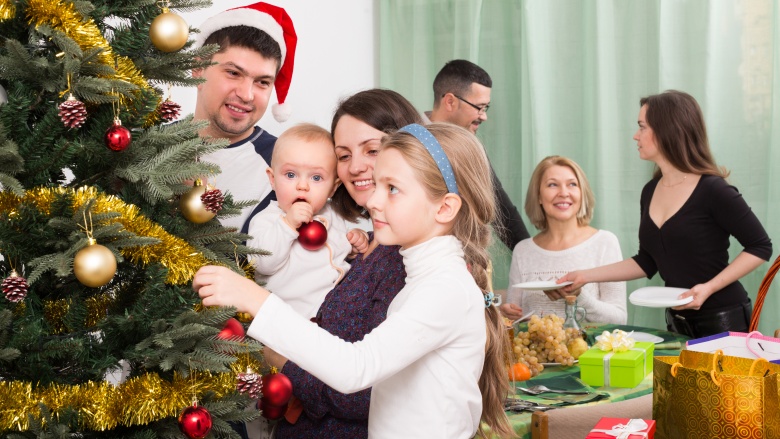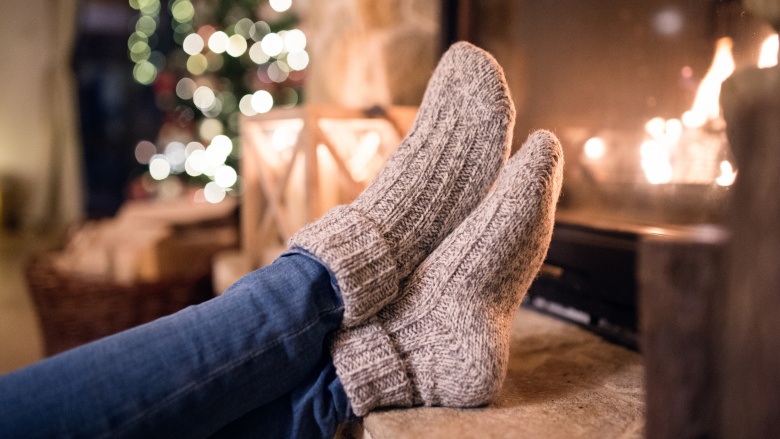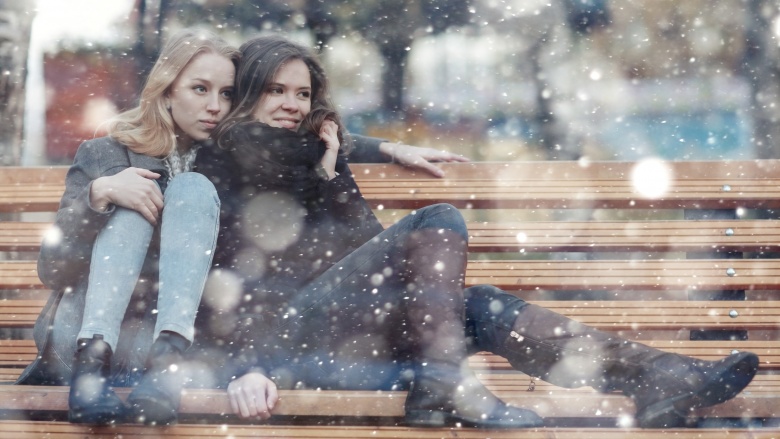How To Cope With Grief During The Holidays
The holiday season is typically a time of good cheer and celebration, but to those that are grieving the loss of a loved one it can be one of the hardest times of the year. Not only are you feeling the opposite of cheery, but everything can be a raw reminder of the empty place that's now in your life. But the holidays stop for no one, and we wanted to know what sort of advice we could give not only to someone who is grieving, but to someone who might have a friend or loved one who is feeling a loss this season.
I reached out to Nancy Weil, a certified laughter leader, grief support counselor, grief management specialist, and funeral celebrant. As the founder of The Laugh Academy, she's uniquely positioned to not only help people heal, but to help them laugh again. Weil is a leading authority on the relationship between humor, laughter, and grief, and she's guided countless people along the journey through grief.
How do I face the holidays?
The holiday season is different when a loved one is missing from it, and Weil stresses this is something no one is alone in experiencing. "It's a continuum," she says. "It's the nature of family, of the holidays. They do change. We cope the best that we can, and if you try? You can find what you need."
Grief is, by nature, a selfish thing — and there's nothing wrong with that. We're so wrapped up in the loss that we feel that it can be hard to reach out of ourselves, and doing that is one of the first steps to getting through the holidays. Reach out to family members who are also grieving, she says, and sit down to figure out what each one of you needs to get through the holidays. Talk about things like who's going to have Christmas dinner. Maybe no one will, and that's absolutely fine. Go out to dinner. There's no right or wrong way to do things like that, and if no one is ready to have Christmas dinner at their house it's fine to go out, in the same way that it's fine to have the same traditional Christmas dinner at the same house it's always been. Getting out of the mindset of there being a right and wrong way to celebrate is crucial, she says, and as hard as it is to sit down with family members to talk about what the holidays are going to look like, it's important. It's a reminder that you're not grieving alone, and it's a way for everyone to make sure they're heard.
"Compromise. What works for one person might not work for another, but remember that you're in this together even if you're not grieving the same. Talk. You'll find there's a way to make sure you all get what you need."
Should I avoid the family get-together?
"Go," Weil says. "Remember that there's no way that you have to be. It's not a performance, there's no lines you need to learn, no way you have to act. You won't know how you're going to feel until you're there, but I almost never hear people say they regretted going."
Those family get-togethers can be a trying time, filled with happiness and cheer and laughter that you might think you're just not feeling. But Weil says that getting out and spending time with loved ones can be a huge part of the healing process, and she suggests a few things to help make it less intimidating. You might want to consider talking to the host ahead of time and telling him or her that there might be a moment where you just need to walk away, to find some space for yourself. Drive yourself, and park in a place where you're not blocked in. The knowledge that you can walk out the door at any moment will help relieve some of the stress of going in the first place, and that can be a huge weight off your shoulders.
Won't I just bring everyone down?
Weil says this is a huge concern that many people have. They don't want to ruin Christmas dinner for anyone. They don't want to bring the room down or make others feel uncomfortable.
"They invited you," she says. "They know what's going on, and they still want you there. With them. They're the people you care about and the people who love you. They'll understand the tears, and they'll understand the need to laugh. They want you there."
In her experience running grief support groups, Weil says that the hesitance to go to holiday gatherings is a big one, and she also says that she always tells people to push themselves just a little bit. Tell yourself you'll go for 10 minutes, 15 minutes... and she says that many people not only stay the evening, but enjoy themselves. They're glad they went, she says, and it's getting out the door that's the hardest part. It's crucial to remember that there's no particular way you're going to be expected to behave. If you need to cry, that's fine. Tears are healing, and people will understand.
What do I do with our traditions?
Every family deals with this one differently. Weil says that she's seen some families change every tradition while others keep everything exactly the same, and others do something in the middle. Talking to family members about what you want to keep and what you want to change is key, and she also says that some families take comfort in adding a new tradition that honors the loved one they've lost.
She suggests some families might find comfort in cooking a memory meal that's filled with favorite recipes, cooked together, and shared along with stories of holidays past. Choose a particular ornament or decoration, and put it in a special place. Create a memory book, and fill it with photos and other mementos. If your loved one sat in the same place at the table every year, some people choose to leave that place empty. Others might choose to have the youngest member of the family take that spot, a symbol of the continuing of life, love, and family. If there was a particular cause that was near and dear, take the time to volunteer in their place. Recognizing your lost loved one and including them in holiday celebrations can be incredibly comforting, and this is another opportunity to reach out to other family members to find out what they suggest.
"You do what you can do," Weil says. "You know they would want you to be happy, and there's nothing wrong with honoring what they would want."
I don't know if I can decorate this year
"There's no decorating police," Weil says. "There's not going to be someone showing up on your doorstep, judging you, telling you that you haven't done enough or that you've done too much."
Decorating can feel like tiptoeing through a minefield of grief, with constant reminders of happier times and holidays past. But Weil stresses that sometimes, familiar decorations can be comforting, too, and that going through those decorations can provide some unexpected surprises. If you have a tree, nativity scene, or village that you always set up, consider doing it with help from friends or family. Do as much or as little as you want, and if you feel like putting everything up, do so. If someone reaches out to offer to help you decorate, at least consider taking them up on it. Invite them over, and if you decorate, that's fine. If you share stories over coffee or drinks and don't decorate at all, that's also fine.
You can also use decorating as an opportunity to add something extra to your holiday traditions in memory of your loved ones. It might be something as simple as hanging their favorite ornaments on the tree, or it might be adding a memorial candle or wreath to the house for the holiday months. There's no one-size-fits-all when it comes to the grieving process, so taking the time to figure out what you need is key.
Take a step back
It's easy to get overwhelmed by the holidays, and one of the most important things you can do is take a step back. That can mean a couple of different things, and they can all help.
Weil suggests getting back to the roots of the holiday season, and that can mean something different for every person. Regardless of what your faith might be, Weil suggests going back to the stories, ideas, and feelings that are at the heart of the season. Strip away the tinsel and gifts, the relentless music, and the feeling that there's a right way to celebrate the season, and figure out what's at the heart of your holiday.
"Find out what's important to you," she says. "That can be anything, from volunteering in the community to a faith-based spirituality. Step away from all the other aspects of it. Think of it as another part of your faith walk, whatever that faith or belief might be. It's about getting back to basics, to the roots, to the people you care about most."
She also says that as hard as it can be sometimes, don't be afraid to ask for help. That can be any kind of help, and it might not even be necessary at times. You might find people reaching out and offering, but Weil says that asking for help when you need it is incredibly important. It's tough for people to know what you might need, and if you ask, their willingness to be there for you might surprise you.
Do something special for New Year's
The holiday season doesn't end with Christmas, and Weil says that New Year's Eve can be particularly difficult — especially if the person you once used to kiss to welcome in the new year is no longer there. It's a time when we naturally look ahead to the coming year, and for someone who's grieving, that year can look pretty bleak.
She stresses how important it is to do something, whether it's on New Year's Eve or New Year's Day. Go out for a meal with friends. Make it a lunch, if you're not feeling up to dealing with the midnight crowds. Reach out in a way that you're comfortable with, and put yourself in a place where you feel safe and comfortable and warm and welcome. And make a resolution.
"I hear people ask, 'What should my resolution be?' Decide. I am going to take care of myself. I am going to spend more time with my friends. With my family. I am going to show up for life."
How do I handle those most stressful moments when it's all too overwhelming?
"There is no storm that lasts forever," Weil says. "The damage might be left behind, but the storm? That passes. And so will the worst moments of holiday grief."
Self-care plays a huge part in dealing with grief through the holiday season, whether it's you that's grieving or a friend. Grief is exhausting, and Weil suggests a few major things that can help a person get through the physically demanding holiday season. Exercise, she says. Get out and go for a walk. If you have a friend that's grieving, call them, head to the park, get outside, and get some fresh air. Eat right. The last thing you might feel like is preparing a healthy meal, but it's essential. It's doubly essential when we're surrounded by cookies and cakes and convenience food. Cooking that meal with a friend is another great way to reach out. Get enough rest. Grief can mean some sleepless nights, and Weil also suggests using things like essential oils and essences for those times when you need to create a safe, comforting space. Support groups can also be infinitely helpful, allowing you to meet people who are going through the same feelings you are in that moment. Knowing you're not alone can make a lot of difference, and groups can be found through your local faith-based organizations, community centers, hospice, or senior centers.
And sometimes, just remember to breathe. Close your eyes, take a step back, and take a few slow, deep breaths.
Enjoy the happy moments
If the grief is still fresh — and even if it's not — you still might feel a certain amount of guilt if you find yourself smiling or even laughing. Weil says that it's not only perfectly normal, but that it's all a part of the healing process just the same as tears are: "They're still in your heart, they always will be. And you know they would want you to be happy."
Grief is an emotional roller coaster, and there will be moments when you find yourself laughing at a particular story or memory, smiling as you're talking about your loved one. It's a part of the healing process, and in the end, that's what the holidays are all about. They're about friends and family, about spending time with those you love, and about honoring those who are no longer with us. If you do find yourself feeling guilty, remind yourself that you have nothing to feel guilty about.
How do I reach out to a grieving friend?
It's not just the person who's grieving who can find themselves facing a difficult holiday season. If you have a friend who is suffering from a loss, it can be difficult to know just how to reach out to them, and what to say. Weil says that reaching out can be the most important thing you can do.
"The most meaningful thing you can do is give them a safe space," she says. "There is no way that you have to be, or they have to be, and giving a person a safe place is the biggest gift you can give. Let them talk. Let them cry. Let them laugh. Let them be."
Reaching out is the easy part, she says, and there's no wrong way to do it. Ask them to go for coffee, or lunch. Ask them if they need help decorating, if they want company when they go shopping, or help wrapping gifts and mailing cards. Be there, and let them be.










